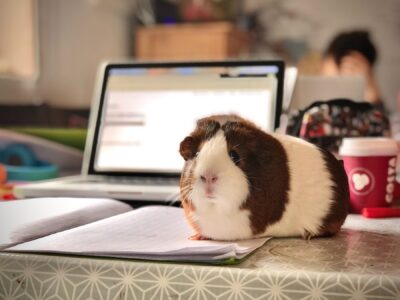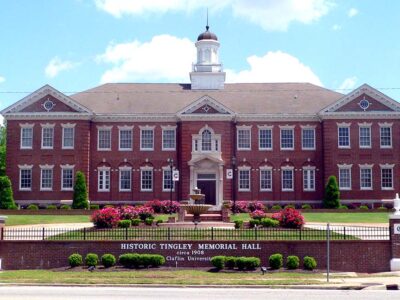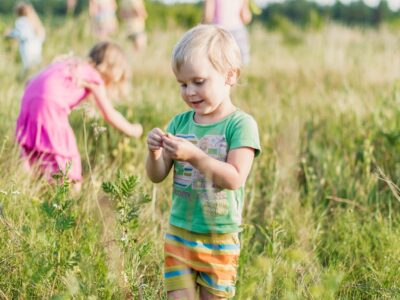Whether you prefer a warm dip in the Gulf of Mexico, the crashing waves of the Atlantic Ocean, a visit to Walt Disney World, or cocktails in the Keys, there’s no denying that Florida attracts tourists, and for good reason—with its balmy temperatures extending nearly year-round, who wouldn’t want to while away a vacation week in the Sunshine State?
But life in Florida doesn’t only involve play; what many may not know is the peninsula’s faith-based institutions are hard at work promoting earth-friendly practices.
Distinctive Programs
Given Florida’s stunning natural landscape, it’s no surprise nearly half of its faith-based institutions of higher education offer majors, minors, and/or certificates in ecology or environmental science/environmental studies. Eckerd College, Florida Southern College, Palm Beach Atlantic University, Barry University, and Ave Maria University honor the state’s plentiful bodies of water by proposing impressive programs in marine biology/studies and/or oceanography. At Eckerd, located in St. Petersburg, students can also study nautical science and maritime affairs or collaborate with the Dolphin Project, which examines the bottlenose dolphin population in the nearby Boca Ciega Bay.
Two of these schools—Eckerd and Palm Beach Atlantic—along with Southeastern University also house programs involving animal life. While at Palm Beach majors in biology can choose a zoology concentration, those at Southeastern can opt for a concentration in veterinary medicine. Eckerd brings learning about the Earth’s creatures to another level with its animal studies program; in this interdisciplinary major, students take courses in the humanities and the social and natural sciences as they delve into the historical interplay between humans and animals.
A few Florida Christian colleges have truly one-of-a-kind sustainability programs or coursework. For example, Florida Southern is the only school in the country to offer a degree in citrus and horticultural science, and its students are fortunate to gain hands-on experience with citrus groves located right on campus. Arming students with essential information to thwart various insects and ailments that threaten citrus crops, the course citrus pest and disease management prepares students for hands-on work in one of the state’s leading industries.
At Edward Waters College, students can take courses in environmental toxicology, and St. Thomas University participates in the Florida-Caribbean Consortium for Agriculture Education and Hispanic Workforce Development (FCCAgE) program. This consortium specifically recruits Hispanic students with eco-friendly passions, training them in agricultural sciences with the goal of employment with the USDA, which funds the program. St. Leo’s University provides its biology majors not only with the opportunity to explore conservation in Florida’s coral reefs and mangrove forests, but also to hop a plane to Peru, Belize, or even the Galapagos Islands to explore their jungles and rainforests.
For learners wishing to take their eco-friendly careers to the next level, several Florida faith-based institutions house noteworthy graduate programs. Up-and-coming Floridian lawyers studying at St. Thomas can tack on a certificate in environmental sustainability to their J.D., and Palm Beach Atlantic students who want to combine pastoral work and sustainability can earn a dual master’s degree in christian studies and global development. The Bethune-Cookman University master’s in integrated environmental science trains students to address contemporary environmental issues from a varied range of viewpoints, as participants take a core of science coursework along with environmental ethics and economics, ecosystem management, toxicology and risk assessment, and environmental restoration.
Student Clubs
When not in the classroom or studying, students at Florida’s Christian colleges join forces in organizing activities focused on promoting eco-friendly practices. Students at Warner University, Florida Southern, and Southeastern embark on earth-friendly projects in partnership with Enactus, an international experiential learning platform dedicated to developing the next generation of entrepreneurial leaders in creating a more sustainable world. Faith meets Creation care in Club Wild, a student organization at Palm Beach Atlantic, whose goal is to “explore and study God’s natural creations.”
While the Barry Green Team seeks to educate on sustainability topics, Ignite, also at Barry, acts to bridge the gap between the campus and its surrounding communities as it promotes affecting “self-sustainable solutions” to a variety of society’s problems, among them environmental. Inspired by Pope St. Francis’ environmental call to action in his encyclical Laudato Si, Ave Maria’s Student Government Association created AveBlue, a program that disseminates information on energy and water consumption. Framing its message in a lighthearted way, the group launched a friendly competition among dorms, with “less” being the term driving victory.
Given the abundance of water surrounding Florida, it’s no surprise student clubs at its universities attempt to tackle issues directly related to maintaining the state’s maritime wellness. With the Flosoco group undertaking ocean conservation at Florida Southern and the Shark Conservation Center Club at Eckerd, students lend their time and talents to protect local resources and species. Inspired by the traditional Jewish duty to repair the world, Eckerd’s Hillel chapter engages its Jewish students—and anyone else who’s interested—to address aquatic pollution in its Scubi Jew initiative, which organizes a “Dive Against Debris” challenge among its many activities.
Other Campus Eco-Friendly Initiatives
On an institutional level, Eckerd continues to grow its commitment to combat pollution in local waterways. In 2018, it received a sizable grant from the National Oceanic and Atmospheric Administration (NOAA) agency, which has funded campus-wide strategizing to reduce single-use plastic items that often end up in local bodies of water. Eckerd also actively seeks to utilize clean energy sources in its buildings, several of which have earned LEED certification. In a similar vein, Florida Memorial University—along with other HBCUs throughout the nation—joined a coalition agreement with the Department of Energy to promote the use of sustainable energy sources and Warner has begun to fuel some of its campus buildings with solar panels and windmills.
Every year, the Barry community holds sustainability service events through its Center for Community Service Initiatives, including Arbor Day of Service to International Coastal Cleanup. Through its Mother Teresa Project, Ave Maria students take annual service trips to Calcutta. In 2014, student ambassadors helped to install solar panels on the Emily House, an all-girl boarding school near Calcutta that previously had no reliable energy source. Ultimately, in giving the gift of light to Emily House, Ave Maria students from the Sunshine State have concretized Jesus’ plea to Mother Teresa to act as a steward in the most downtrodden slums of Calcutta: “Come, be my light.”





 Copyright
2024
Root and Vine
Copyright
2024
Root and Vine